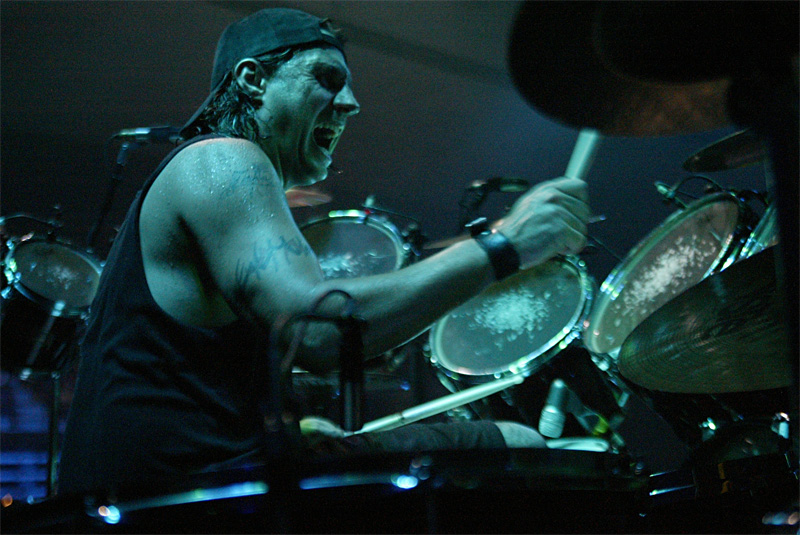When Los Angeles–based metal band Slayer released Reign in Blood in the fall of 1986, they changed the shape, speed, and tone of the genre forever. Clocking in at a mere 29 minutes, the Rick Rubin–produced album took the thrash-metal formula the band had deployed on their previous two releases and tightened it dramatically, streamlining and strengthening Jeff Hanneman and Kerry King‘s guitars, plumping up the rhythm section, and pushing vocalist Tom Araya to the front of the mix. Though 1983’s Show No Mercy and 1985’s Hell Awaits were powerful works that seethed with a formidable degree of evil, Reign in Blood turned Slayer into true metal monsters. As local musician Curtis Hall (of Grand Archives) once astutely observed, RIB was “The Texas Chainsaw Massacre of metal.”
RIB was certified gold in 1992, but that was six years too late for drummer Dave Lombardo, who had grown weary of the starving-artist lifestyle and was more interested in a stable family life. “I had my personal issues, and at the time I had just gotten married and my bills weren’t getting paid, so I said ‘I’m out of here, I’m just going to get myself a job.'”
With his signature double-bass-drum assault, Lombardo was a key element of the band’s sound, and his departure was alarming to his bandmates, Rubin, and even his new wife, who eventually convinced him to return to the fold in 1987 in time to record follow-up effort South of Heaven. For the Cuban-born percussionist, it only made sense for him to find a way to make a living playing music.
“Living in a Cuban household, music is a big part of [life]—music and food,” says Lombardo via phone before the band’s show at Denver’s Magness Arena. “We’d go to these parties where there’d be Cuban bands [with] playing and drinking and food…It was like a social club, where people would go for a release. There was percussion all the time. It did influence me quite a bit.”
Though the teenage Lombardo was initially fixated on American rock-‘n’-roll acts—Cream in particular—it was his brother-in-law who really opened his musical borders. “He had a huge collection of Latin jazz music that he was continuously exposing me to,” he explains. “At 13 or 14 years old, I was really just into wanting to hear ‘American’ music, but subliminally, somehow, it stuck, and now [Latin jazz] is the music I seek out the most, along with Middle Eastern and African percussion.”
Lombardo met guitarist King when he was 16. “I was told he was the spoiled kid whose dad bought him a bunch of guitars,” he recalls. “When I had my first job, I drove by the house and he was outside, I approached him, and the rest is history.”
That history includes plenty of ups and downs, including Lombardo’s second departure in 1992, shortly after the “Clash of the Titans” tour, which included Slayer’s peers Megadeth and Anthrax.
“At that time, I was very much isolating myself,” he says, now sounding almost mystified by his motivations. “I felt I wasn’t enjoying myself, for whatever reason. It was a weird time.” That he was also about to become a father for the first time no doubt also played a role. Over the next 10 years, Lombardo stretched himself beyond the boundaries of his previous bands, recording his own interpretation of Vivaldi’s Four Seasons and collaborating with art-punk savant Mike Patton and Melvins guitarist Buzz Osborne in the group Fantômas.
In 2002, he came back to Slayer a second time, and now seems not only content but creatively renewed, approaching his drum kit with a more pared-down mind-set. At the suggestion of a drum tech, he decided to remove a couple of toms, forcing himself to restructure his playing.
“A lot of jazz and funk drummers are doing this, and that stuck in my mind as a little tool to use to re-inspire me,” Lombardo says. “It’s like rearranging your furniture in your home. It gave me a different perspective on my kit, and changed my approach when I had to come up with drum rolls and parts.”
He’s also getting the remarkable chance to re-experience the “Clash of the Titans” tour with the original lineup, including Megadeth, Anthrax, and opening act Testament. Unlike with many revival efforts, the venues this time around are even bigger than those of 20 years ago.
“I’m absolutely grateful for that,” says Lombardo. “The casino circuit or the fair? I hope I never have to do that,” he laughs. “I will make sure that my life will not go there.”








